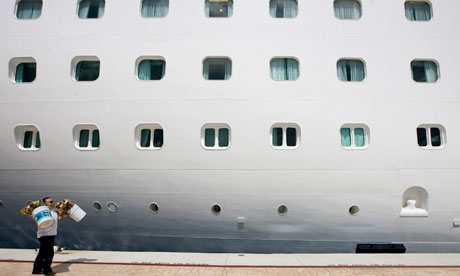Cruise ships are a floating microcosm of our global economic hierarchy
Titanic-style divisions below deck on luxury cruises are still evident 100 years on, exploiting an international workforce - Paul Mills

A vendor offers flowers for sale outside Royal Caribbean's cruise ship Enchantment of the Seas. Photograph: Reuters
The Titanic, and its striking imagery of the cross-section of Edwardian life, is vividly ingrained on our imaginations. Upstairs: the luxury, the opulence, champagne and chandeliers. Below deck: Irish migrants, Italian waiters, the toil and trouble of a committed crew. Exactly 100 years later, the luxury is no longer so exclusive and the lowest-tier workers certainly aren't European – but not all that much has changed.
Dispatches' investigation Cruises Undercover: The Truth Below Deck, which airs tonight on Channel 4 and for which I spent five weeks undercover as an assistant waiter, reveals some of the harsh realities below deck for the multinational workforce who grind to provide once-in-a-lifetime holidays for almost 2 million British cruisers a year. But how is it that these cruises, as explained in this report from 2002, have been able to get away with providing working conditions well below the legal minimum in the UK for so long, even when operating out of British ports?
On 4 August, I set sail from Southampton on the Celebrity Eclipse, an impressive Royal Caribbean-owned cruise liner accommodating just over 4,000 passengers and crew. I was to sign a six-month contract stipulating I'd work straight through without a single day off, living in a small shared cabin. My typical working schedule was 70 hours a week, not including the intensive training schedule I would have to attend in my spare time between shifts. My basic salary was a mere £31 a month, leaving me almost entirely reliant on tips to earn a living. I was assured by the company I'd get a minimum guaranteed wage of £466 a month, equivalent to £1.54 per hour. If I failed to reach this total in tips, the company would make the difference up to me.
I soon met colleagues much worse off than me. I had joined several rungs up the ladder in the caste-like division of labour on the ship; the lowest-ranked workers behind the scenes – plucked primarily from India, the Philippines, Indonesia, Latin America and Jamaica – work eight-month contracts without a single day off (sometimes extended to 10 months or more), earning a fixed wage of around £1.24 an hour, with no tips to top this up. They work a 70 hours per week, and often do extra jobs on top of this, such as cutting hair, cleaning staff cabins and laundry, in order to supplement their income.
Furthermore, these lower-ranked workers often spend anything up to £2,165 in agency, visa, medical, uniform and flight costs before even starting work, finding themselves trapped in a situation of modern indentured labour in which they spend much of their first contract simply paying off the debts they incurred joining the ship. Once on the ship and heavily indebted, their bargaining power is severely weakened.
Equally odious are the strategies that keep staff performing impeccably despite exhausting conditions. Staff in customer-facing positions are paid a negligible wage, so are almost entirely reliant on tips from passengers to make up their salary. Any off-days, and they simply won't make their tips. For those not in tipping positions, the system is far harsher. If they drop the ball they might receive a warning, which means no promotion for a whole year.
Such working conditions are certainly not unique to Celebrity ships. So how is it that ships full of British passengers setting sail from Southampton do not have to comply with British employment laws? The "flag of convenience" is an agreement that allows ships to be flagged in another country, thus avoiding labour regulations and taxation in their country of origin. Despite being headquartered in the US, Celebrity Cruises is registered in Liberia, with the ship I worked on flagged in Malta.
This opens the door for cruise companies to seek out a labour force from around the world that would accept conditions that British workers never would (I was the only Englishman on the whole ship doing my job). A race to the bottom ensues, in which labour becomes racialised dependant simply on what conditions workers will accept. Certain nationalities (Filipinos, Indonesians, Indians, Jamaicans) tend to be the only ones prepared to take the lowest jobs, so they usually have to start at the bottom and work their way up. Eastern European and Turks don't need to accept such low pay and long contracts, so start off, like me, several steps up the ladder, and go on to occupy most supervisory roles. Lower-tier workers often keep coming back to the ship, as the company dangles them a carrot in the form of far-off promotions and eventually a better salary. Indeed, for many workers who do stick it out, the ship provides them with a valuable income-stream that enables them to support families back home, and for this they remain grateful despite the toil. But with families to feed, and a lack of jobs at home, this idea of choice often remains an illusion.
The ship is a poignant metaphor for wider global divisions; above deck, British passengers who have grown accustomed to affordable luxury, while below deck, an international workforce that has grown equally accustomed to providing the service to make this possible. The cruise ship acts as a floating embodiment of free-market capitalism, shrewdly avoiding international regulations so that maximum profit can be extracted. This convenient tactic should be stopped, so that ships are bound to laws of the country out of which they operate. That way, a cruise may become a good place to work as well as unforgettable trip for passengers.
Source: The Guardian, London, UK.
No comments:
Post a Comment